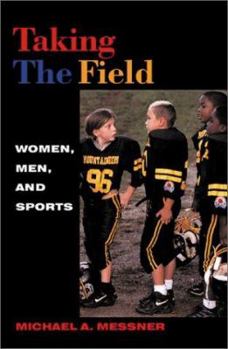Taking the Field: Women, Men, and Sports
Select Format
Select Condition 
Book Overview
In the past, when sport simply excluded girls, the equation of males with active athletic power and of females with weakness and passivity seemed to come easily, almost naturally. Now, however, with... This description may be from another edition of this product.
Format:Paperback
Language:English
ISBN:0816634491
ISBN13:9780816634491
Release Date:July 2002
Publisher:University of Minnesota Press
Length:264 Pages
Weight:0.80 lbs.
Dimensions:0.5" x 6.1" x 9.0"
Customer Reviews
3 ratings
Interesting text book
Published by Thriftbooks.com User , 13 years ago
I had to read this book for a class, the book was easy to read. I liked the writing style of the author, I learned lots of information from this book!
A feminist man who's both smart and honest
Published by Thriftbooks.com User , 21 years ago
Here are a few of the many reasons I keep reading everything Mike Messner writes:1) He seems to take the feminist "personal is political" slogan to heart, revealing much more of himself and his own questions and vulnerabilities than most other male writers.2) He uses both academic and journalistic techniques to research his topics and support his theses. 3) He lacks the arrogance of many experts, retaining an open mind as he delibertely attempts to look at things in original ways.4) The topic of this book -- and several of his others -- continues to fascinate me. By looking at how we "do gender" in a sporting context, we come to understand so much about how and why any and all women and men behave as we do.Highly recommended. -- Mariah Burton Nelson
Putting Sport into the Center of Gender
Published by Thriftbooks.com User , 21 years ago
USC Sociologist Michael Messner, who has spent the majority of his academic career studying issues of sport, masculinity, and power has written a truly significant book with Taking the Field: Women, Men, and Sports. The book finds a place for much of his previous research, as well as the research of other gender and sport scholars, to elicit the mechanisms in which gender is produced, reproduced, and contested in sport. The premise of the book holds that gender is a product of structure, culture, and an individual's interactions within culture. This serves as the launching point for a deft discussion of the affects of sport in America. Messner has a talent for seeing the larger picture in seemingly "normal" events, and in Taking the Field he analyzes the affect that "normal" interactions in sport has on the subjugation of women and gay men, and the real and symbolic violence committed against both women and men by men.Messner's work is important to scholars of both sport and gender, but is particularly important to gender scholars who too frequently fail to recognize the power sport, and sport media, has in shaping current gender relations, particularly the institutionalization of manhood. But Taking the Field is also highly recommend for anybody who has an interest in understanding the larger implications of American sport, beyond winning and losing. It is a must read for coaches, parents, and educators who have anything to do with sport.To help us understand how theory hits the road, Messner highlights familiar news events such as the Columbine Massacre, or the 1999 Women's World Cup Championships, and analyzes them from a social-feminist perspective. In such he clearly elucidates the perils of the way we do sport in America and shows us that the concepts and theories he speaks of are not just found on the pages of books - that they are real, with real life application, and have a very real affect on people's lives. Taking the Field is also important because it brings both homophobia and the mediea into the center of analysis. Whereas much attention has been given to the media's role in gender relations, I have been wholly discouraged by the absence of homophobia from much sport literature, and from sport in gender literature. Taking the Field shows the significance homophobia plays in sport, shaping and maintaining athletics as a masculine and heterosexual institution, and how important sport is in the production of genderIn the end Dr. Messner suggests that resistance to the system is possible (perhaps even inevitable). The masculinist center of sport has a soft underbelly and it is currently challenged by individual sports, female athleticism, the growing presence of gay male athleticism, and progressive individual men who are no longer willing to allow the system to function in a homophobic and misogynistic manner. But while these challenges to a hegemonic masculinity have threatened sport's ability to be openly sexist and homop




